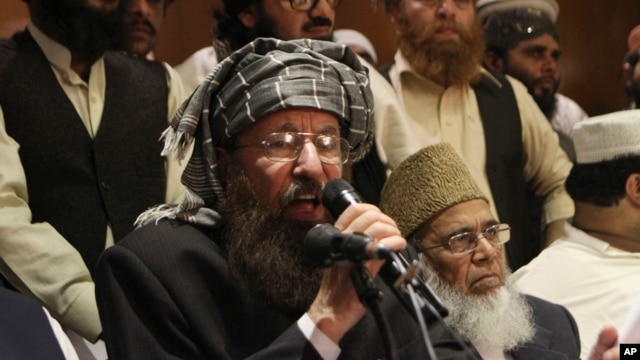
Maulana Sami-ul-Haq ,a Pakistani religious cleric and member of Taliban's negotiating team, speaks during a press conference in Lahore, Pakistan, Feb. 15, 2014.
ISLAMABAD — Taliban militants in Pakistan claim to have slaughtered 23 security forces who were being held captive - a devastating blow to controversial peace talks aimed at ending the Islamist insurgency that has plagued parts of the country for years.
A faction of the outlawed Pakistani Taliban says the paramilitary troops were executed Sunday night to avenge what it alleged were killings of several militants in government custody within the past week.
The announcement came hours before a government delegation was to meet Taliban intermediaries for a fresh round of talks on Monday. The massacre provoked Prime Minister Nawaz Sharif’s government to cancel the scheduled interaction.
Omar Khalid Khurasani, leader of the Taliban faction based in the northwestern Mohmand tribal district, told VOA he favors the peace talks but will not end revenge attacks if the government carries out what he calls “extra-judicial” killings of his fighters in future. The militant leader is confident the dialogue with the government will not be affected and says his group will observe a cease-fire, provided the government does it first.
Khurasani also said the Taliban has long believed the government is not sincere in peace talks, otherwise it would have not killed Taliban prisoners while the peace process is underway. He dismissed reports that his faction is going against the policy of the main Tehrik-e-Taliban Pakistan (TTP), which is holding talks with the government through a team of religious scholars, including a senator and a former parliamentarian.
Prime Minister Sharif has strongly condemned the killings of the Pakistani soldiers, saying it will have a negative effect on the peace process.
Putting to put the talks back on track will be a difficult task, said Rustum Shah Mohmand, a member of the government negotiating team.
“I think there is only one chance of protecting the process, if the main body of the TTP dissociates itself from the statement of Omar Khalid Khurasani, or if they try to explain that (he) is not perhaps an integral constituent of the (TTP) movement and that he has given the statement in his personal capacity or maybe to sabotage the (peace) process," Mohmand said. "That is the only way I think we can salvage this process.”
Army authorities describe the latest killings as a highly provocative terrorist act, saying Taliban allegations of “killing of terrorists in their custody are baseless and meant only to justify dastardly acts of terror.”
But the Sharif government remains under severe criticism for attempting to engage in peace talks with a group that has taken responsibility for murdering thousands of Pakistanis in recent years.
Skeptics, like Ashraf Jahangir Qazi, the former Pakistani ambassador to the United States, say the government lacks clarity while dealing with a group known for its anti-state actions.
“You have a body (TTP) which is banned, which is proscribed, a body which denies the existence of the constitution, a body which says the entire judicial system of Pakistan must be replaced by what they regard as an Islamic system," Qazi said. "And government is finding ways to negotiate with them because it is sort of confessing it does not have a military option against them.”
The TTP and its associate groups are mostly based in Pakistan’s northwestern tribal regions on the Afghan border where it has allegedly set up training camps to dispatch suicide bombers inside the country and send fighters for subversive acts in Afghanistan.
Analysts believe a failure of the peace process is likely to increase chances of a military offensive against Taliban hideouts in the North Waziristan tribal region, identified by U.S. officials as an “epicenter” of international terrorism.
|
|
